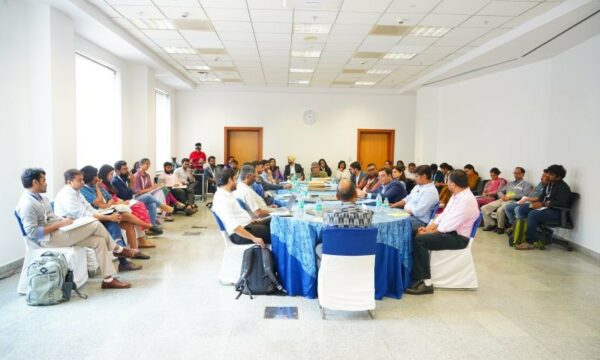Welcome to the third and final blog of this series. CABI recently hosted a webinar on Opening up agricultural research and data with a great panel of expert speakers who highlighted some of the many opportunities inherent in “open agriculture” (click here to view the webinar).
In the first blog of the series, I looked at how funders and the corporate sector see the potential of open agriculture. In the second, I considered the researchers’ point of view – the people who actually implement open science. In this final blog, working for a development organization myself, I want focus on open agriculture as it relates to international development – an important subject for sustainable development, and one where time is of the essence; we have just 10 years to deliver on the Sustainable Development Goals (SDGs), including SDG 2: Zero Hunger.

One of the strongest arguments in favour of open science is its potential to equalise access to agricultural knowledge, evidence of what works, and valuable data for groups that may, until now, have been denied that opportunity. Linet Juma, Program Officer at the Local Development Research Institute, described how open data can drive opportunities for women in Africa.
Women make up 55% of the agricultural labour workforce in sub-Saharan Africa, yet they face many more constraints than men across value chains. Closing the gender gap with targeted investments in women farmers could yield enormous benefits to women, their families, communities and countries.
Many countries do not have explicit policies to address key challenges for women spanning: access to land, finance, infrastructure, training, technology and information. There is a real need for evidence and data to develop effective and sustainable responses that span these highly inter-connected challenges.
Open agricultural data is critical in enabling women to access accurate and timely information on farming practices, and to utilising predictive farming tools to make the best decisions. It is also vital in providing evidence-based policy and for tracking what works and what doesn’t. There is a real opportunity to harness open data and encourage collaboration, but this requires (some common themes across all speakers):
- – strengthening the policy environment for open and shared data
- – building capacity and strengthening data ecosystems to collect manage and share data
- – making it inter-operable across sectors and value chains.
Having looked at the issues and opportunities around Opening up agricultural research and data in agriculture, it is clear that the data ecosystem is much more than a series of inter-connected data feeds and platforms or networks – it is fundamentally about people. In his synthesis of the various themes, Martin Parr, Data and Services Director within CABI’s Digital Development team, argued that there has been a lot of focus from various donors and funders on big technical investment in the platforms for data collection and sharing but less on those whom the technology seeks to serve.
He highlighted that there has been less focus on some crucial aspects of the ecosystem including the culture, practice, policies, and the people that do the work of opening up and sharing data and research outputs. He described the value of mapping the ecosystem to look for where data and value is currently flowing, and identifying the blockers to how we can share data more effectively.
When considering the constraints, it is best to start with the people and the problems they face – using human centred design to co-create solutions – and reviewing the associated processes, policies and rules needed to make them a reality. In his view, technology considerations should come last as a logical flow from understanding people and the way they work. A key issue to motivating new behaviours is nurturing incentives to drive data sharing, which requires a mixture of carrots or sticks, depending on the context. CABI is working with one of the world’s most influential development organisations, the Bill & Melinda Gates Foundation to embed this thinking in its programmes, supporting them to become more people-focussed in their technology investments, putting data sharing much more firmly at the heart of agricultural development.
Final thoughts
As I draw this blog series to a close, I am more convinced than ever that Opening up agricultural research and data holds huge promise as we seek to address the massive challenges facing us all in terms of meeting the food security needs of a growing population at a time when our climate is also under threat. What struck me is that if we are to drive real change then we are going to need a mix of top-down mandates, driven by funders, governments and businesses, backed up by infrastructure, systems and processes that are designed for humans, who are incentivised and rewarded for sharing their agricultural research outputs more openly.
So, if you agree, let this be a call to action to everyone within your own research group or organization to put together a concerted plan for how you will open up your agricultural research and data!
To view the presentation slides, click on the links below:
- – What opportunities are there for open agriculture data to improve development outcomes for women in Africa? – Linet Juma
- – Integrated open frameworks for agriculture – Martin Parr
Linet Juma is a Program Officer at the Local Development Research Institute. She has a background in journalism and communications with a Master’s degree from the London School of Economics and Political Science. She has previously worked on media development research and creating and managing online and offline content for civil society organizations, research institutions, and advocacy groups. She is focused on the role of open government and open data in improving development outcomes for women and girls in Africa.
Martin Parr is Data and Services Director, Digital Development at CABI and has over fifteen years’ experience of working on digital agriculture, mobile extension, web-based products, and research communication services. I manage knowledge services for International Development, and is Head of Open Data at CABI. Martin specialises in data policy, programme management, business development, key account management, research communication and knowledge management, monitoring and evaluation, and mobile services.
CABI believes that a crucial way to solve problems in agriculture and the environment is by creating, managing, curating and disseminating information. Through our experience in scientific research, publishing, knowledge management and communications, we put know-how into the hands of the people who need it most. CABI’s Open Access programme supports researchers and institutions in sharing knowledge and data. Through the open access preprint service agriRxiv, our open access journal CABI Agriculture and Bioscience, our growing list of open access books and our open tools, like the Plantwise Knowledge Bank and Invasive Species Compendium, as well as through data policy development services, we work in partnership with national systems, donors and partners to improve access to development, scientific and operational data in agriculture and food systems.
Related News & Blogs
Unpacking FAIR’s jargon: The Indian example
Ameen Jauhar, Data Governance Lead in CABI’s Digital Development team, examines the importance of the FAIR (Findable, Accessible, Interoperable, and Reusable) data principles. Drawing from his experience in data governance and policy, including his wor…
16 October 2024




